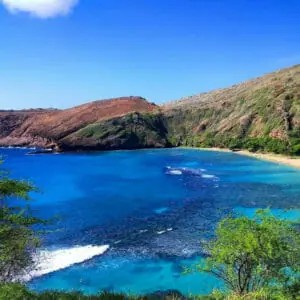
Pacific islands, including Hawai’i, are vulnerable to the effects of climate change, especially sea-level rise, and extreme weather events. That’s why Master of Sustainability Solutions (MSUS) students Hailey Campbell, Latrell Kaye, and Tammy Nguyen are working with Local2030 Islands Network to create an adaptation framework to enhance islands’ capacity to deal with climate change impacts. Through locally-driven and culturally informed practices, they hope to advance sustainable development in island communities using the United Nations Sustainable Development Goals* (SDG).
Read more about the team’s effort in the Q&A below.
Sustainability Connect Question (SC): What is the purpose of the Local2030 Islands Network?
Green Growth Team Answer (GGT): The Local2030 Islands Network is a coalition of islands that was formed to encourage peer-to-peer knowledge for developing locally-relevant and culturally-informed solutions necessary for achieving progress on the Sustainable Development Goals and adapting to climate change. To guide this process, the Local2030 Islands Network established a set of four key guiding principles:
Principle 1: Identify local goals to advance the UN Sustainable Development Goals and strengthen long-term political leadership on sustainable development and climate resilience.
Principle 2: Measure SDG progress through tracking and reporting on local, culturally informed indicators.
Principle 3: Strengthen public-private partnerships that support diverse stakeholders in integrating sustainability priorities into policy and planning.
Principle 4: Implement concrete initiatives that build island resilience through locally appropriate solutions, particularly at the water-energy-food nexus.
SC: What is your project?/How does this project promote best practices?
GGT: Achieving the SDGs does not just mean setting targets, raising money, or making a plan. It also means working together to combine everyone’s strengths to effectively design integrative programs for accelerating ambitious climate action and adaptation efforts, while encouraging growth in our economy. To promote goal setting and knowledge-sharing, the Local2030 Islands Network utilizes the concept of “Green Growth,” which alludes to promoting economic growth and development while conserving natural assets and environmental services to ensure future well-being. This project seeks to enhance the Local2030 Island Network's efforts to advance green growth on islands as requested by network partners by creating an island-specific Green Growth Framework based on the experiences of existing Green Growth initiatives in Hawaii, Guam, and Tasmania.
SC: How are the local community members involved in the project? How do we incorporate community knowledge brokers in environmental work to move past one form of knowledge?
GGT: Islands have historically relied on traditional knowledge to adapt to natural disasters and sudden events. For example, in Hawai`i, “malama aina”, taking care of the land and waters that feed them, is a guiding principle in their way of life which has informed how they have been autonomously responding to natural disasters for hundreds of years. Our project recognizes that storytelling and the oral word need to start being acknowledged as equal to data and science as one of the leading solutions to solving the climate crisis.
Our project elevates the importance of embodied knowledge through conducting interviews and distributing a questionnaire to island leaders in Hawaii, Guam, and Tasmania who were the first to take the lead in implementing green growth initiatives. Each of these islands has their own unique way of engaging their community members, but all recognize the importance of including them in their planning and implementation efforts.
SC: When it comes to sustainable development, who should be involved?
GGT: The impacts of climate change on islands are very complex. This complexity requires collective action from various stakeholders on different spatial scales. Efforts must include local community members and changemakers, local government officials, and actors from the energy, natural resource management, and education fields. This project recognizes that due to the smaller scale and local limitations on resources, islands are better able to understand how human and natural influences affect resource availability and adapt accordingly.
SC: How will the goals be achieved?
GGT: We will be sourcing knowledge, lived experiences, and advice from respected leaders to inform a framework that can assist any island that chooses to implement it. Through interviews, surveys, and case-study analysis, our team will create a locally-relevant and culturally-informed framework that islands can adopt, adapt and apply towards building their green growth initiatives. The framework will include highlights on who to involve, how to maintain engagement, potential barriers, the importance of including Indigenous communities and aina, the sense of place.
SC: What is the desired outcome of this project?
GGT: To assist Local2030 Islands Network in scaling island-led solutions for fulfilling the SDGs, our goal is to design an experience-based framework to guide islands in implementing their own green growth strategies based on best practices. As such, our desired outcome is to learn from the stories and practices of island leaders who have successfully launched green growth initiatives to create a “Green Growth Framework for Island Communities.” We hope this framework will inspire and empower islands to work together and learn from each other in fostering a sustainable future.